
Previous in Permutation and Combination Next in Permutation and Combination
Question Number 195672 by mr W last updated on 07/Aug/23
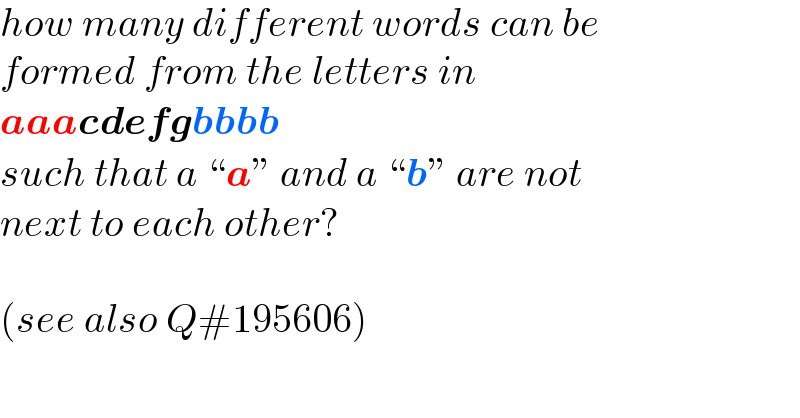
$${how}\:{many}\:{different}\:{words}\:{can}\:{be} \\ $$$${formed}\:{from}\:{the}\:{letters}\:{in} \\ $$$$\boldsymbol{{aaacdefgbbbb}} \\ $$$${such}\:{that}\:{a}\:``\boldsymbol{{a}}''\:{and}\:{a}\:``\boldsymbol{{b}}''\:{are}\:{not} \\ $$$${next}\:{to}\:{each}\:{other}? \\ $$$$ \\ $$$$\left({see}\:{also}\:{Q}#\mathrm{195606}\right) \\ $$
Answered by liuxinnan last updated on 10/Aug/23
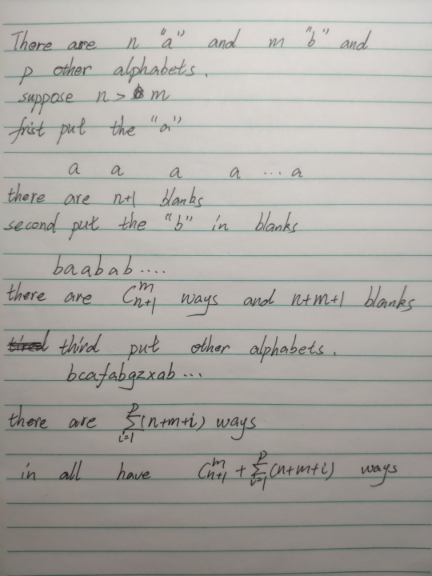
Commented by mr W last updated on 10/Aug/23
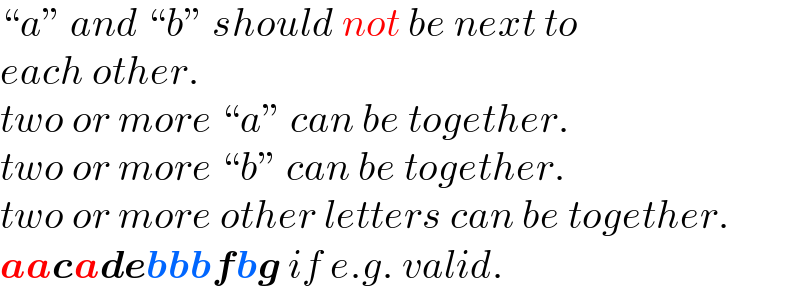
$$``{a}''\:{and}\:``{b}''\:{should}\:{not}\:{be}\:{next}\:{to} \\ $$$${each}\:{other}. \\ $$$${two}\:{or}\:{more}\:``{a}''\:{can}\:{be}\:{together}. \\ $$$${two}\:{or}\:{more}\:``{b}''\:{can}\:{be}\:{together}. \\ $$$${two}\:{or}\:{more}\:{other}\:{letters}\:{can}\:{be}\:{together}. \\ $$$$\boldsymbol{{aacadebbbfbg}}\:{if}\:{e}.{g}.\:{valid}. \\ $$
Commented by liuxinnan last updated on 10/Aug/23

$${I}\:{misunderstood}\:{it} \\ $$
Commented by liuxinnan last updated on 10/Aug/23
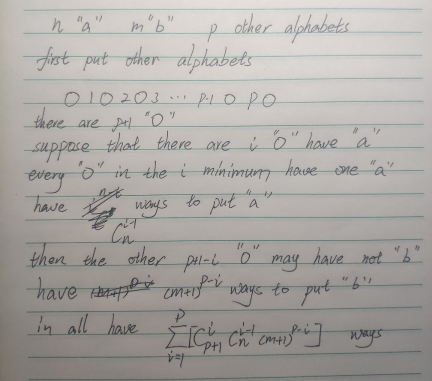
Commented by mr W last updated on 11/Aug/23
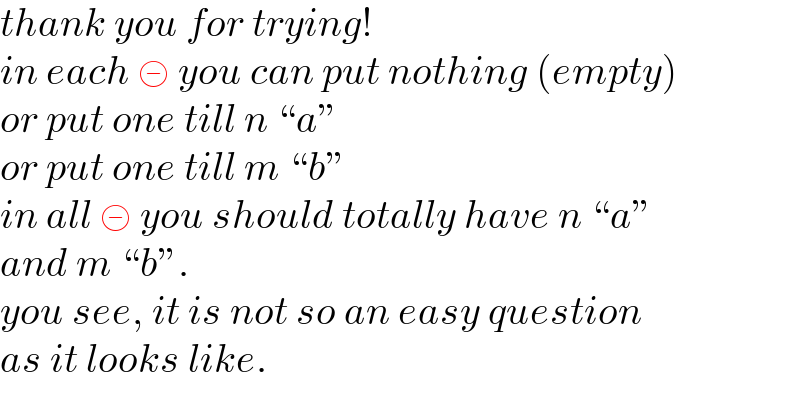
$${thank}\:{you}\:{for}\:{trying}! \\ $$$${in}\:{each}\:\circleddash\:{you}\:{can}\:{put}\:{nothing}\:\left({empty}\right) \\ $$$${or}\:{put}\:{one}\:{till}\:{n}\:``{a}'' \\ $$$${or}\:{put}\:{one}\:{till}\:{m}\:``{b}'' \\ $$$${in}\:{all}\:\circleddash\:{you}\:{should}\:{totally}\:{have}\:{n}\:``{a}'' \\ $$$${and}\:{m}\:``{b}''. \\ $$$${you}\:{see},\:{it}\:{is}\:{not}\:{so}\:{an}\:{easy}\:{question} \\ $$$${as}\:{it}\:{looks}\:{like}. \\ $$
Answered by mr W last updated on 11/Aug/23
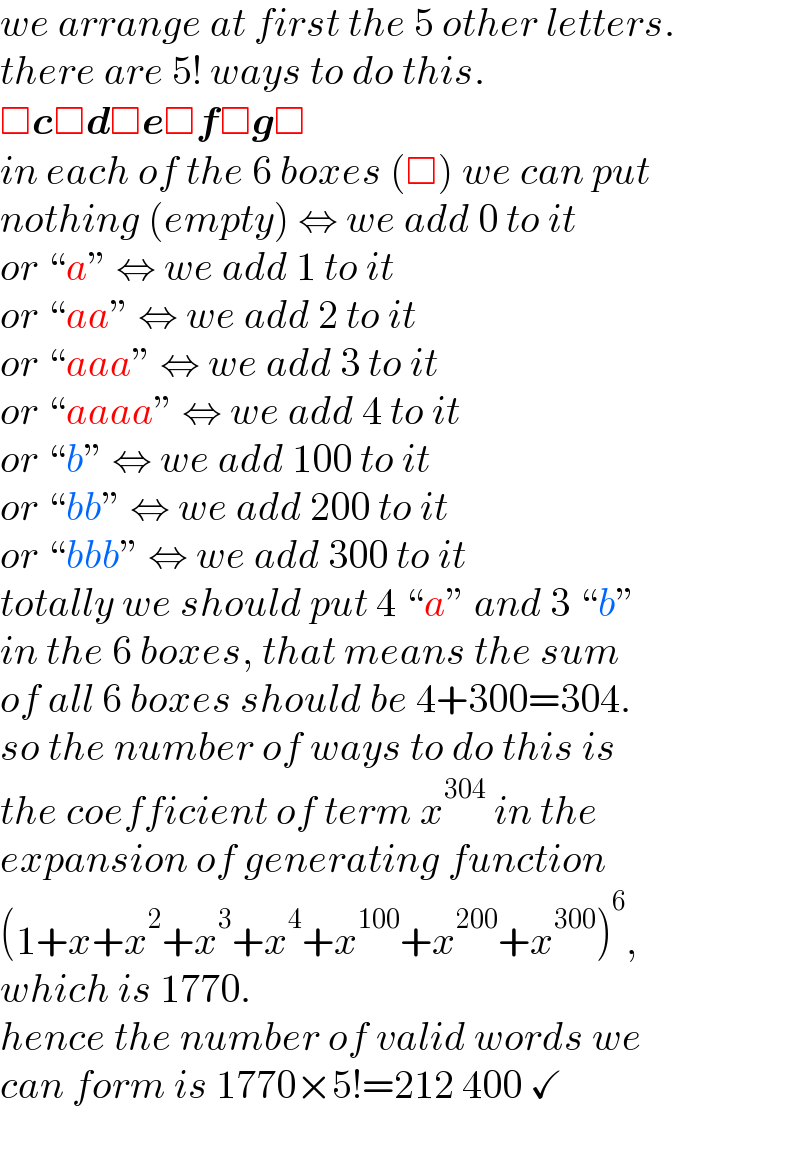
$${we}\:{arrange}\:{at}\:{first}\:{the}\:\mathrm{5}\:{other}\:{letters}. \\ $$$${there}\:{are}\:\mathrm{5}!\:{ways}\:{to}\:{do}\:{this}. \\ $$$$\Box\boldsymbol{{c}}\Box\boldsymbol{{d}}\Box\boldsymbol{{e}}\Box\boldsymbol{{f}}\Box\boldsymbol{{g}}\Box \\ $$$${in}\:{each}\:{of}\:{the}\:\mathrm{6}\:{boxes}\:\left(\Box\right)\:{we}\:{can}\:{put} \\ $$$${nothing}\:\left({empty}\right)\:\Leftrightarrow\:{we}\:{add}\:\mathrm{0}\:{to}\:{it} \\ $$$${or}\:``{a}''\:\Leftrightarrow\:{we}\:{add}\:\mathrm{1}\:{to}\:{it} \\ $$$${or}\:``{aa}''\:\Leftrightarrow\:{we}\:{add}\:\mathrm{2}\:{to}\:{it} \\ $$$${or}\:``{aaa}''\:\Leftrightarrow\:{we}\:{add}\:\mathrm{3}\:{to}\:{it} \\ $$$${or}\:``{aaaa}''\:\Leftrightarrow\:{we}\:{add}\:\mathrm{4}\:{to}\:{it} \\ $$$${or}\:``{b}''\:\Leftrightarrow\:{we}\:{add}\:\mathrm{100}\:{to}\:{it} \\ $$$${or}\:``{bb}''\:\Leftrightarrow\:{we}\:{add}\:\mathrm{200}\:{to}\:{it} \\ $$$${or}\:``{bbb}''\:\Leftrightarrow\:{we}\:{add}\:\mathrm{300}\:{to}\:{it} \\ $$$${totally}\:{we}\:{should}\:{put}\:\mathrm{4}\:``{a}''\:{and}\:\mathrm{3}\:``{b}'' \\ $$$${in}\:{the}\:\mathrm{6}\:{boxes},\:{that}\:{means}\:{the}\:{sum} \\ $$$${of}\:{all}\:\mathrm{6}\:{boxes}\:{should}\:{be}\:\mathrm{4}+\mathrm{300}=\mathrm{304}. \\ $$$${so}\:{the}\:{number}\:{of}\:{ways}\:{to}\:{do}\:{this}\:{is} \\ $$$${the}\:{coefficient}\:{of}\:{term}\:{x}^{\mathrm{304}} \:{in}\:{the} \\ $$$${expansion}\:{of}\:{generating}\:{function} \\ $$$$\left(\mathrm{1}+{x}+{x}^{\mathrm{2}} +{x}^{\mathrm{3}} +{x}^{\mathrm{4}} +{x}^{\mathrm{100}} +{x}^{\mathrm{200}} +{x}^{\mathrm{300}} \right)^{\mathrm{6}} , \\ $$$${which}\:{is}\:\mathrm{1770}. \\ $$$${hence}\:{the}\:{number}\:{of}\:{valid}\:{words}\:{we} \\ $$$${can}\:{form}\:{is}\:\mathrm{1770}×\mathrm{5}!=\mathrm{212}\:\mathrm{400}\:\checkmark \\ $$
Commented by mr W last updated on 11/Aug/23

